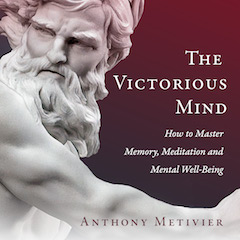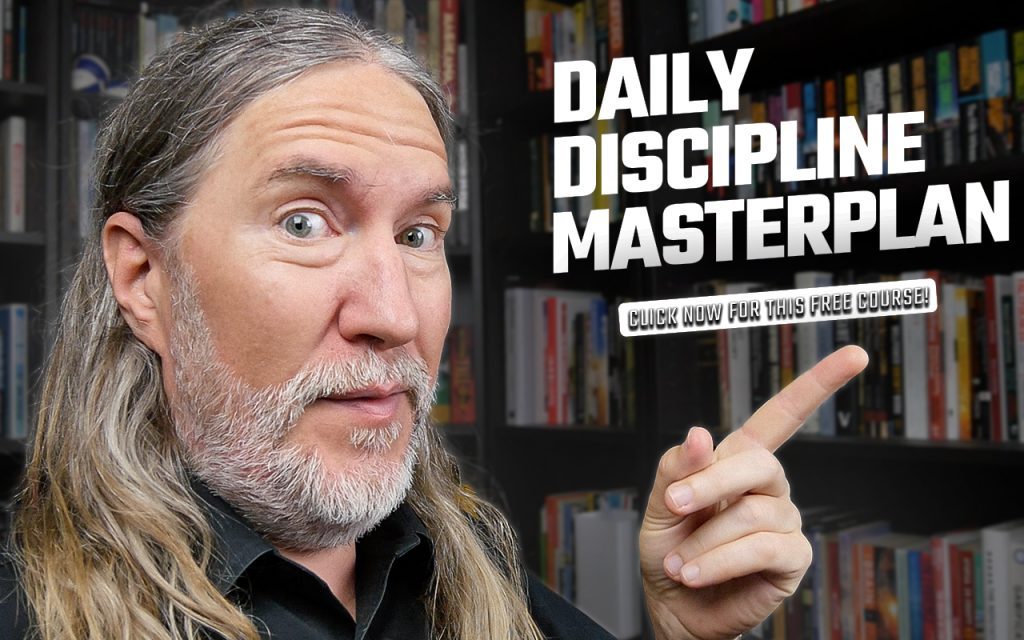If you want to know how to stop thinking about the past, there’s a really weird way to do it.
It can be fast and easy.
But let’s face it.
Nothing is the same way for all people.
So if it takes you a bit longer to stop thinking about past memories, that’s okay.
And there’s a higher achievement you can experience as well.
It’s one step beyond the counterintuitive options.
I like to think of it as the “ultimate option.”
This one’s a big more challenging, but the challenge itself will strengthen your mind.
We’ll get into it soon, but let’s start by asking a very simple question:
What Is The Past And Why Can’t I Stop Thinking About It?
In a word, the past is something managed by one thing:
Your memory.
Of course, memory is not just one thing. It’s a variety of operations that run like an engine to produce consciousness. Kind of like how a car engine works in combination with a variety of parts to create velocity.
And just as the byproduct of a car’s velocity is exhaust fumes, past memories we don’t want to think about are the product of how our memory burns the fuel of reality.
What are these levels of memory?
And other levels.
So, if reality is the fuel of our memory and it creates byproducts, probably the areas of the past we don’t like have gotten “stuck” in autobiographical memory and episodic memory.
And this “stuckness” creates a feedback loop in procedural memory that keeps returning to the thoughts to us again and again.
It’s like a Twilight Zone version of being addicted to dopamine produced by playing with a slot machine.
How To Stop Thinking About The Past In A Positive & Healthy Way
There are a number of tactics you can employ.
One of them is counterintuitive, but you might not be ready for it.
Another is what I think of as the ultimate option.
But let’s first look at a variety of techniques I’ve tested during my many years of research into the nature of the self and the field of self improvement. I believe they’re all useful to explore.
And approaching them with an attitude of experimentation is key. When you don’t rely on them to “work,” you’ll probably get more out of the exploration exercise.
At the end of the day, they all pretty much involve a kind of “pattern interrupt.”
Nick Bendit is a researcher doing great work in this area. He sees a lot of it the problem having to do with implicit memory. I agree and see implicit memory as a means of healing your unconscious mind.
Although you might not have the dark thoughts his work addresses, if you’re not comfortable with scientific studies, no problem. He’s a great speaker and his presentations on unwanted thoughts and memory are on YouTube.
Now for a list of tactics and techniques that have worked wonders for me.
One: Write The Past Down
Now, you might be thinking, “Hang on! I want to stop thinking about the past. Won’t writing about the past create more thoughts?”
Possibly. But only for the short term.
I never used to believe this, but I’ve heard a lot of people say that until something is dealt with, there’s no room in the brain for other things. The Zeigarnik Effect is a well-established theory for why this happens and it has to do with open loops.
For example, I recently called out one of my students for flat out lying during one of my presentations. I didn’t know for sure that he was lying, but the loop opened in my head and I had zero mental space for anything else until it could be closed.
Overall, it did not feel good to call this person out. And there’s probably no way in which I look very good for having made such a big deal about this misrepresentation.
But as I wrote about it, I was able to forgive myself because even if I didn’t handle it in the best possible way, according to neuroscientist Sam Harris on lying, my ethics were intact. The individual had said that I was trying to solve a graduate problem related to Artificial Intelligence with a third grade understanding. That’s fine and I can handle a metaphor like that.
However, when he next said that he had written an AI with pencil and paper, one that created reliable predictions used to improve production outcomes in a factory, my Carl Sagan-inspired Baloney Detection Kit came to the fore. I asked this individual to explain where the pencil and paper stored the memory related to running the calculations.
Instead of receiving a direct answer, the person continually told me that I wasn’t “getting it.”
I pressed the issue until the person admitted that he had actually used a spreadsheet and a random number generator. I suggested that before someone assume that people with grade three education in AI can’t follow the plot, he might consider starting with a truthful representation. It’s true that I can’t understand how to use a spreadsheet in that way, but to say that you’re using pencil and paper when you’re actually using a spreadsheet… that’s bound to open a loop in a mind like mine.
Writing out everything that happened after reviewing the recording to ensure that I hadn’t misheard something helped me stop thinking about the episode.
So whenever past thoughts keep arising, write about them.
Two: The Talking Cure
We spend so much time communicating through social media that we don’t exercise our mouths as much anymore.
But when people actively engage in friendships, the science shows that overall health increases. As does psychological well-being. Aristotle demonstrated this fact philosophically thousands of years ago in The Nichomachean Ethics. It’s one of the best books about happiness ever written.
However, the trick is to have a larger friendship circle. The smaller the circle, the higher the chance of conflict, which can lead to more unwanted memories. To build your friendship circle can be as easy as finding the longest lineup in front of the most popular restaurant. You’ll probably start talking to others in a natural way soon enough, without having to go through the pains of introducing yourself.
Whenever you talk with people, this is key:
You don’t want to use the conversion to dwell on the unwanted thoughts.
Rather, you can discuss the nature of thought itself and get ideas from your friends about how they deal with unwanted memories.
Or you can sidestep the issue altogether by running through your happy memories. A simple exercise is to rehearse your memories of how you met and 2-3 of your favorite experiences together.
Three: Read Books About The Nature of Thought
As Gary Weber shows in Happiness Beyond Thought, thought is a slippery fish.
The more you know about it, the more you can catch them and throw them out of the boat of your mind.
Sure, this learning process can take some work. And there are endless book recommendations to pursue.
The trick is to just get started and follow your interests. Apart from the Weber book I just mentioned, you can try:
- Philosophy Now (magazine subscription)
- Stillness Speaks
- The Surrender Experiment
Four: Explore The Past Lives of Others
I included Stillness Speaks and The Surrender Experiment for a few reasons.
For one thing, they are great studies of the nature of thought. But more importantly, they are written by people who have come to grips with past experiences.
Almost every biography will give you a portrait of people who have dealt with thoughts about their past. Maybe they never found ways to deal with it. In fact, some people have had their careers diminished or destroyed because they could not deal with their minds.
I’ve dodged many bullets by reading biographies. For example, I have been drawn to some radical artists in my time. This interest probably comes from seeing a reflection of my own energies in what they achieved in their art and writing.
But reading about the lives of people like Wyndham Lewis have given me clues about how not to live.
So many people fail to avoid problems in life because they simply don’t have a wide enough view of what it means to have a mind.
The solution is to read as much as you can about other people. Read biographies frequently and you’ll be able to place your past in a much larger context.
Through contextual comparison, you can neutralize unwanted thoughts about your past much faster.
Five: The Counterintuitive Option
Instead of seeking an alternative, lean into your thoughts about the past.
Now, you will likely want to take care around this process. But as I’ve shared before related to the research that guides how I’m handling my Harm OCD, sometimes you need to bring what you don’t want closer. In fact, pushing it away often only makes it stronger.
I’m not talking about Freudian return of the repressed – though that concept could play a role. I’m thinking more of awareness through negation. For example, if you tell yourself, don’t think of a red cat, you’ll probably have a hard time avoiding the thought. You have to think about it in order to try and get it to go away.
But when we openly think about our personal histories, we can tap into what has been called “acting self awareness.” Greg Goode calls it “standing as awareness.”
To describe my own experience with this, when a memory I’d rather not have comes up, rather than push it away, I imagine myself hugging it in the tightest and most loving embrace that I can.
Should the memories arise again, taking them into a gratitude meditation can be very helpful along with some journaling. Making the memory as multi-sensory as possible also helps, and sometimes making them cartoonish and laughable is useful too.
Six: The Ultimate Option
When it comes to learning how to stop thinking about the past, entering a flow state on demand is a powerful solution.
How can you make that happen?
In my experience, it’s fairly easy, as it happens.
You build a habit stack around physical health, diet, sleep and regular meditation.
Not just any meditation, however. A style of meditation designed to neutralize thoughts.
The fastest way to learn this is from my TEDx Talk:
I memorized a lot more than these two questions, but they’re fantastic for neutralizing unwanted memories almost as quickly as they arise.
You can also go one step further.
When I continued feeling the sting of memories I did not want, I used the location as a Memory Palace. In the Memory Palace, I memorized a piece of Sanskrit designed to help with releasing unwanted thought.
If you’re not yet ready to memorize long form Sanskrit as I have done, you can start small with learning a neti, neti routine. You don’t even have to use Sanskrit. You could try “cancel, cancel” when unwanted thoughts arise.
For more robust training on this, please check out my book, The Victorious Mind. It’s on Amazon.
Long story short, the ultimate option combines flow state with mental content that rapidly and effectively reduces and potentially removes unwanted mental content.
Once you get the hang of it, you’ll be able to “defang” many aspects of the past. But there’s one more step to consider.
Seven: The Forgiveness Function
Forgiveness is hard.
It’s hard to forgive others, and it’s hard to forgive ourselves. Even harder is to reach out and ask for forgiveness when you were in the wrong.
But to truly learn how to stop thinking about the past, we need to learn how to do it.
In the Enigma of Reason, the authors explore why doing the logical thing is so difficult. And they propose one reason involving the social nature of thinking.
This deeper background into how our mind works is so critical. Our minds don’t necessarily have our best interests in mind. The mind gives us reasons that we don’t even understand. To shortcut the brain’s rationalizing when it’s harmful, you can readily learn to forgive. Daily, if that’s what it takes.
Become the Past To Stop Thinking About It
In The Victorious Mind, I quote Leonard Cohen who said that if you don’t become the ocean, you’ll be seasick every day.
I believe that to overcome the past, you need to think of it like that: a process of being what you’re trying to reject.
Is this a challenging approach?
Yes, but only at first.
And you really shouldn’t worry too much about exactly what might happen when you lean into your thoughts about the past. Chances are, they are not as bad as you think, and you might discover aspects of yourself you’ll wish you’d met sooner.
The best part?
As soon as one set of unwanted thoughts are loosened and free – even if they return – you’ll have mental space to consider other things. This openness will create more context, especially if you keep widening your friendship circle so the “enigma of reason” can do what it does best as a social activity.
So what do you say?
Do you feel enabled to enjoy a completely new relationship with your past?
Before we go, if you enjoyed this post and would like more help, please consider going through my Daily Discipline Masterplan guide and video course. It’s free:



